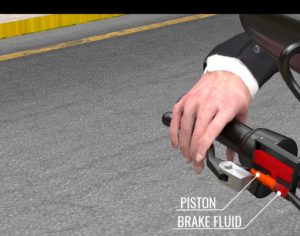Are you thinking of changing the brakes of your electric bike to hydraulic brakes and are you looking for a way to make sure of how important they are to you?
Well, in this post, we will explain how the hydraulic brakes work in an electric bike, and also what are its advantages and disadvantages, and is there really a difference when changing the brakes of your electric bike to the hydraulic system?
Now let us answer your question directly, and I will explain the answer to you in a simple way, away from the fact that I work as an engineer who deals with machines on a daily basis.
How Do Hydraulic Brakes Work On An eBike?

As a general rule, hydraulic brakes work by compressing the brake fluid using the brake lever, and with this pressure the fluid moves within a line that connects the brake pads, and with this pressure, the pads move And presses on the brakes disc, which causes the bike to stop.
What we said in the previous section is the simple way of the idea of how hydraulic brake work, but it should be noted that this method has been greatly developed during the last 60 years, and the development has focused on the method of pressure, type of oil, type of brake pads, as well as the thickness of the brake disc.
On the other hand, the method of airflow to the brake disc has been developed, and this is very important because the friction of the brakes with the disc, results in high heat, which required a practical method to help reduce the temperature.
Now that we know how hydraulic brakes work, let’s take a detailed look at the advantages and disadvantages of hydraulic brakes.
Hydraulic Brakes Advantages
1- Less lever pulling
As a general rule, you will need half of the effort you make to pull the brake lever in the hydraulic brake. The reason for this is that there are 2 pistons in the hydraulic brake system. The first is small in size next to the lever, and the second is larger in size and is close to the brake pads. Less effort to start the brake fluid pressure.
Does this really make a difference?
You might say that this might not be a strong feature to get me to spend more tilt on the hydraulic brakes but based on my personal experience you will feel the difference if you are riding smooth and long distances.
2- No Adjustment Needed.
One of the most important advantages of hydraulic brakes for cyclists is that they do not need an adjuvant while riding
In my opinion, this feature is important for all-electric bike riders, whether they are experienced bike riders or beginners.
The reason for this is that beginners may not have enough experience to do the adjustment of the brakes correctly (in the case of mechanical brakes), but for the experienced, it is considered a waste of his time while riding an electric bike.
3-The hydraulic brake doesn’t get muddy.
One of the features of the hydraulic brakes is that it is a sealed system to ensure the force of pressure, and this sealed system works, on the other hand, to prevent dirt from forming inside the brake parts, as is the case in mechanical brakes.
Hydraulic Brakes Disadvantages.
1-High price.
One of the disadvantages that we can think of when upgrading our brakes to hydraulic brakes is the price, because their price is rather high, ranging from 150 to 300 dollars.
2-Need spcial maintenace.
Hydraulic brakes need specialists to carry out maintenance work, and the main reason for this is that the specialists have tools to help them put brake fluid without any air.
This is because the air reduces the pressure of the oil inside the brakes and thus weakens the brake force.
3-Sometime it didn’t work!
The hydraulic brake system in my opinion is a system close to the automatic system, but sometimes it does not work properly (and here I am saying based on personal experience that it may have happened with me only).
Sometimes the oil pressure does not occur immediately after pulling the brake lever and you only need to pull the lever Brake more than once to stop the bike.
What is the best buying builtin hydraulic brake ebike or buying a mechanical brake then upgrading?
Most mid-range electric bikes come with mechanical brakes, where hydraulic brakes are an added advantage in high-end bikes.
But you may think about buying a medium-class bike (and an average price as well) and then upgrading the brakes, and here I will share with you some of the things that may meet you in the event that you think of upgrading the hydraulic brakes.
1- There is no brake switch.
Most of the bikes are in the upper category of electric bikes that have hydraulic brakes that have a switch inside the brakes that locks the electricity off the motor while pulling the brake lever, and for the record, this switch is alow required in some US states.
On the other hand, if you find hydraulic brakes for electric bikes, you must make sure that their plug fits your bike.
That is why you should think carefully before buying any type of hydraulic brake and combination for your electric bike
2-Lenght of the cables matters.
When thinking about buying hydraulic brakes, you must make sure that the length of the brake wire is suitable for your bike, because there are some bikes that need a brake length that is slightly longer than the standard length, such as the Rad Wagon.
3- Losing the standard levers.
In some electric bikes, the brake lever has some features such as a bell, for example, and when changing the brakes to hydraulic, they may only have some of these characteristics.
There are some solutions to these obstacles, such as converting mechanical brakes to hydraulic brakes using a dedicated connector (I have not tried it myself).
You can see this video explaining how the connector works with other details about hydraulic brakes.
What you should expect after upgrading your ebike brakes to hydraulic?
As a general rule, there is no difference in the strength of the hydraulic brakes from the mechanical brakes as long as the mechanical brakes are all properly tuned.
what you really feel like an essential difference is comfortability while using the brakes, the stability of the strong performance of the brakes, in addition to the lack of need for maintenance in the hydraulic brakes.
Conclusion.
As a general rule, hydraulic brakes work by pressurized brake fluid using the lever. The pressurized oil goes to a small piston in a line connected to another large piston close to the brake pads, which leads to the movement of the pads and friction with the disc, which causes the tires of the electric bike to stop.
Hydraulic brakes have many advantages, including ease of use of the crane, less need for maintenance, strong performance stability, and no need for adjustment.
One of the disadvantages of hydraulic brakes is that they are high in price, they need specialists in maintenance, and they may stop working suddenly.
Useful resources.
How Long Do Ebike Brakes Last? (Explained)
